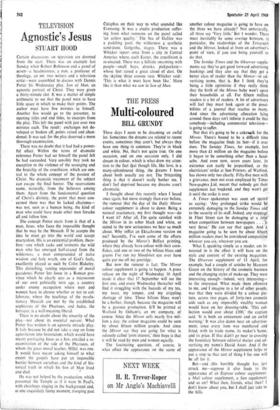Multi-coloured
THE PRESS BILL GRUNDY
These days I seem to be dreaming an awful lot. Sometimes the dreams are related to recent events, sometimes they aren't, but always they have one thing in common. They're in black and white. No, that's not quite true. On one occasion, and on one occasion only, I did dream in colour, which is what drew my atten- tion to the fact that though life, like love, is a many-splendoured thing, the dreams I have about both usually are not. The Interesting thing is that it doesn't really bother me. I don't feel deprived because my dreams aren't chromatic.
I thought about this recently when I heard once again, but more strongly than ever before, the rumour that the day of the Daily Mirror colour supplement is about to dawn. Being a natural reactionary, my first thought was—do I want it? After all, I'm quite satisfied with the Mirror in its sober black and white, so suited to the new seriousness we hear so much about. Why inflict an Ektachrome version on me? Secondly, I've seen some of the efforts produced by the Mirror's Belfast printing, where they already have colour with their corn- flakes, and one or two of the bilious blues and greens I've run my bloodshot eye over have quite put me off my porridge.
But now the rumour is fact. The Mirror colour supplement is going to happen. A press release on the night of Wednesday 16 April made it clear that 17 September will see the first one, and every Wednesday thereafter will find it struggling with the hazards of my tea, my toast, my temper, and my crippling shortage of time. Those bilious blues won't be a bother, though, becauSe the magazine will be a gravure production. It'll be printed at Watford by Odham's, an IPC company, of course. Since the Mirror sells nearly five mil- lion a day, the colour magazine could be seen by about fifteen million people. And since the Mirror say they are going for what is odiously called 'joint interest,' their hope is that it will be read_by men and women equally. The fascinating question, of course, is what effect the appearance on the scene of another colour magazine is going to have on the three we have already? Not unnaturally, all three say 'Very little.' But 1 wonder. There must inevitably -be some overlap between, in particular, the readerships of the Telegraph and the Mirror, looked at from an advertiser's point of view, if you can bring yourself to do that.
The Sunday Times and the Observer supple- ments say they've got good forward advertising bookings and they also say that they get a better class of reader than the Mirror—in ad- vertising terms, that is. But I think they're being a little optimistic if they really think that the birth of the Mirror baby won't upset their households at all. For fifteen million readers is a lot of readers. A lot of advertisers will feel they must look again at the possi- bilities of a journal that reaches so many. And since the advertising allocation lying around these days isn't infinite it could be that somebody—including commercial television— is going to suffer.
Not that it's going to be a cakewalk for the Mirror. There's bound to be a difficult time before the magazine finds its feet—if it ever does. The Sunday Times, for example, lost more than £1 million on the magazine before it began to be something other• than a head- ache. And even now, seven years later, its existence can easily be jeopardised, as the electricians' strike at Sun Printers, of Watford, has shown only too clearly. Fifty-five men with a grievance, men not even employed by Times Newspapers ,Ltd, meant that nobody got their supplement last 'weekend, and they won't gbt it until the strike is over.
A Times spokesman was soon off word' as saying: 'Any prolonged strike would S extremely damaging to the Sunday Times and to the security of its staff. Indeed, any stoppage. in Fleet Street can be damaging at a time' when competition between newspapers . . . is very fierce.' He can say that again. And a magazine 'going to be seen by about fifteek million readers must be considered competitilm' whoever you are, wherever you are.
What I, speaking simply as a reader, am in- terested in is the effect it will have on the style and content of the existing magazines. The Observer supplement of 13 April, for example, had a couple of articles by Maureen Green on the history of the cosmetic business and the changing styles of make-up. They were interesting enough—indeed, very interesting— to the interested. What made them offensive to me, and I imagine to a lot of other people, was that they were divided by a colour pic- ture, across two pages, of forty-two cosmetic aids such as any impossibly wealthy woman would have on her dressing-table. 'This col- lection would cost about f300,' the caption said. 'It is both an enticement and an awful warning.' It was also damn near an advertise- ment, since every item was numbered and listed, with its trade name, its maker's dame, and its price. If that didn't go near to crossing the boundary between editorial matter and ad- vertising my name's David Astor. And if the appearance of the Mirror supplement helps to put a stop to that sort of thing I for One will be all for it.
But—and .this horrible thought has just struck me—suppose it also leads to the appearance of an Express colour supplement, a Mail colour supplement, a Sun supplement and so on? What then, friends, what then? I don't know about you, but I shall just take to the










































 Previous page
Previous page